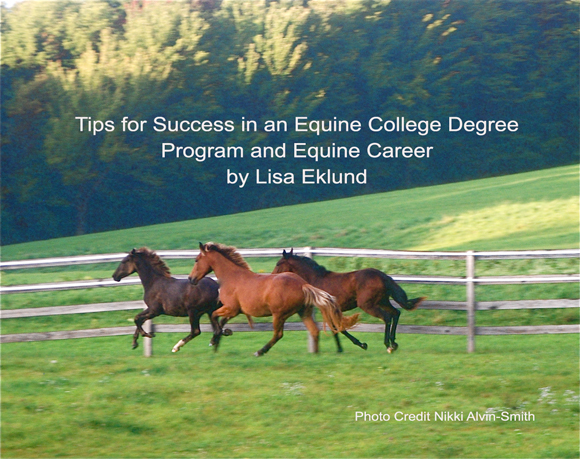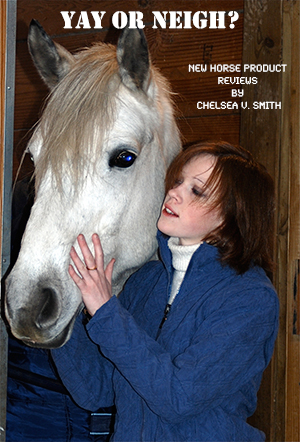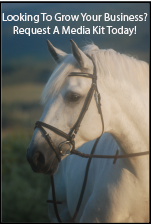Tips for Success in an Equine College Degree Program and Equine Career
by Lisa Eklund

Recently I was asked to do a talk for an IEA (Interscholastic Equestrian Association) team. The general topic of the talk was what judges look for in a rider, but I also answered many different questions. One of those was, “What, as a college professor, are you looking for in an equestrian student and what do you recommend for their success in an equine career?” It was a great question and started an interesting discussion. Since then, I have thought it would be a good topic to share with a larger audience.
Students entering into equine degree programs tend to have a variety of equine experience from beginner through advanced. Many people are amazed that someone with little or no equine experience would consider a career in equine science and are equally surprised that they can be successful. Of course, a strong background in equestrian activities will give a prospective student a “leg up” in an equine degree program and an eventual career. That is a given. However, experience alone is not what will make someone a success, nor is a student without experience doomed to failure. I am going to share some of my observations and suggestions after an 18-year career as a professor in an equine science college program in order to help ready a prospective equine science student for success.
I did say that equine experience is not a must, but any good equine experience you can get before starting an equine program will help. Deciding what is good or not is hard for someone new to any field, but do your research, ask around and choose the best instructors and trainers with the most experience, good references and successful businesses. If you can’t afford lessons of any kind, you can find a local farm and ask them if you can observe, help for free and soak in all of the information you can. You can also ask a veterinarian or farrier if you can ride with them to get exposure to that side of the horse business. A job at a tack shop or feed store will give you additional opportunities to learn more about the horse industry. Groups like 4-H, the Pony Club and the IEA can give you the opportunity for less costly ways to gain experience. The internet is also a valuable resource for great articles and instructional videos.
Even the most accomplished riders need to broaden their exposure to all parts of the horse business in order to have a successful equine career. Just knowing how to get on a horse and ride is not enough to make someone an accomplished equine professional. Learn all you can about horse health, lameness, anatomy, nutrition, hoof care, dental care, and all aspects of care to maintain a happy and healthy horse. Study proper grooming and conditioning and know your horses inside and out. Understanding equine behavior is essential. Study horses in any way you can and then practice, practice, practice at getting proficient with all aspects of horse care and training. Get to know all of the equipment used in training and caring for horses. Understand the use of the equipment and what is good and what is not. Learn what all the different medications and supplements are for and the conditions they treat. When equine professionals such as other trainers, veterinarians, farriers and dentists visit your barn watch, ask and learn about what they do. If you can’t afford to ride in a clinic, go and audit. Watch as many lessons as you can and go to shows and watch the schooling area as well as the classes. You may not be able to afford a horse, or to take lessons or compete, but horse shows, seminars and clinics are often free or very inexpensive opportunities to further your knowledge. Go to all types of shows and clinics. Get to understand the diversity of the equine industry. Learn about all disciplines and the vast variety of equine careers there are available. You don’t have to ride or train to be in the equine industry. Keep your mind open to all career possibilities.
An equine science program is not all about riding and working in the barn. Don’t expect to go to college for equine science and get away without a commitment to academics in many areas. You will be studying the science of the horse as far as anatomy, physiology, nutrition, breeding, and general health and wellness. That alone requires a commitment to studying. Most equine degree programs also require business classes and general education classes such as history, math, literature, composition, the natural sciences, and the social sciences. As much as it may seem that learning about these subjects has no connection to success in the horse business, you still need to do well in them and they do serve a purpose. It is important to have a good understanding of the world and the people in it, language, math and science and to be articulate in many areas in order to be successful and to live a rich life. Be a student of people and yourself as well. Get to understand yourself and your strengths and weaknesses. Build on those strengths, acknowledge your weaknesses and work to strengthen those parts of yourself. So study hard and learn as much as you can about as many subjects as you can. Keep your mind open to any knowledge that comes your way. Make sure that you take as many business classes as you can. No matter how strong you are in any field, you need to know how to market yourself and your business and you need to understand the ins and outs of operating a successful business.
Everything already mentioned is only one part of the recipe towards a successful equine career. The most important tip I can give an aspiring equine professional is to grow all of your soft skills starting right now. When I am contacted by professionals in the industry looking for interns and employees they want someone with a solid background in equine knowledge and skills. However, what they require most, in addition to those hard skills, are a variety of soft skills. The combination of a broad knowledge of hard skills with the demonstration of a variety of soft skills is what gets you hired, keeps you employed and helps you move up the career ladder. It is that combination of skills that I teach to my students.
What are soft skills? They are the skills that are needed in any profession to navigate successfully in interpersonal interactions, to stay organized and on task and to keep working most efficiently. Julia Llewellyn Smith’s definition gets right to the point when describing soft skills and their importance. “The talents that business gurus have pinpointed as the modern workplace’s most sought-after qualities. Including intangible attributes such as punctuality, flexibility, good communication and cooperativeness, soft skills are impossible to quantify but are, according to increasingly exasperated bosses, potentially far more valuable than exam results.” (1)
There are many soft skills and an internet search will result in a variety of lists. All soft skills are beneficial to have, but I would like to focus on a select group of skills that I feel are extremely important for anyone in the equine industry. These skills are: strong work ethic, time management, communication, collaborative ability, positive attitude, team player, networking, conflict resolution, emotional intelligence, flexibility, the ability to take criticism, resilience, strong interpersonal skills, problem solving, critical thinking, and two of my favorite soft skills, a growth mindset and grit. Wow! That is a very long list. I am not going to explain each skill in detail, but I am going to tie them together and give you examples of how they are needed for success. An understanding of how these skills are important to a successful career in the equine industry will help to generate the incentive to build and grow them.
Success in anything does not come easy. A strong work ethic is essential in the equine industry, particularly when working directly with horses. Horses are a 24/7 responsibility. Like any animal, they need to be fed and cared for daily and they don’t take off for the holidays. Horses don’t plan their schedules to have their health problems between 9-5 on Monday-Friday. An evening, weekend or holiday colic or other health emergency is not unusual when working with them. So work ethic, flexibility, time management, resilience, a positive attitude and grit are all necessary to handle unexpected emergencies with horses. Besides emergencies, horse care and training requires more than a 40 hour a week commitment. Horse shows and other events take the professional horse person on the road and require long hours for success. Lessons and shows occur on the weekends and evenings when clients are available. Time management and organizational skills are essential in order to make a schedule run smoothly and efficiently in order to keep these long hours at a minimum.
Some people who work with horses love a connection with animals but don’t really like connecting with people. That certainly is not true for everyone who works with horses but it is not unusual. To be a success in the equine industry, it is important to build your interpersonal skills. Day-to-day responsibilities require communicating with clients, supervisors, employees and other professionals. In order for a business to run smoothly, these communications between humans need to be as seamless and positive as human to horse communications. Networking is also a great skill to have. The need to generate clients and sales requires skills to make positive connections throughout the industry and community. Attending local events, becoming a member of equine and non-equine boards, groups and committees is one of the best ways to get the word out about you and your business. People get to know you and you are the first person they think of when recommending your area of expertise. When you are at a show or other event, it is important to make positive connections even though you are in a competitive environment. If you are competing and you are not happy with the results, you need to take the criticism the judges have made with an open mindset. That means looking inward to see where you can improve and being excited about the challenge to do so. It will not serve you well to bad mouth the other competitors, the events or the officials. Creating a positive reputation when you are in the public eye on and off a horse is very important. That requires an open mind, a positive attitude and the ability to accept instruction and criticism with grace.
As a professional in the equine industry you will be faced with the need to solve problems and be a critical thinker on a daily basis. Training issues arise, horse health problems occur, equipment breaks down and many other issues regularly occur. You will need to be able to think in the moment and make informed decisions in order to solve whatever issues come your way. Often this involves working with a team of people in a collaborative fashion. You will need good emotional intelligence skills to do so. Emotional intelligence is the ability to read the emotions of yourself and others and respond in an appropriate fashion to get the best results. Sometimes this may involve conflict resolution between people or between a rider and a horse.
The above skills are valuable whether you are working directly with horses or in a supportive part of the industry. You will have to adjust your schedule to work with the busy schedule of others in the industry. You will still have to network. In fact, that may be a big part of your job if you are in any way involved in sales. You will have to accept criticism from clients and supervisors and keep an open mindset in order to grow as an expert in your field. All of the interpersonal skills will certainly still be important. Hard work and passion for what you do will be needed no matter what you do in life. This all connects to my favorite soft skill, “grit.” Angela Duckworth describes grit in her TED Talk as “passion and perseverance for very long term goals.”(2) Grit is the skill that enables you to build and grow all of the other skills even when things are tough(3). It is the factor that keeps you going and following your passion. It is easy to love doing something when things run smoothly but it takes more than passion to continue to do something when there are struggles involved. The reality is that things never run smoothly all of the time. “Grit is not just having resilience in the face of failure, but also having deep commitments that you remain loyal to over many years.”(4)
Success in the equine industry, or any industry, requires a commitment to hard work, learning, open mindedness and growth over the long haul. You can begin to build hard and soft skills right now. The hard skills are easier to define. Soft skills require you to do some honest self-reflection to recognize what skills you have and what skills you need. Then you need to work on them. You may think if you don’t have these abilities now, you never will. But that is not true. New research in neuroscience, specifically in the area of neuroplasticity, has shown that the brain has amazing abilities to generate new neuropathways to new behaviors.
For a long time, it was believed that as we aged, the connections in the brain became fixed. Research has shown that in fact the brain never stops changing through learning. Plasticity IS the capacity of the brain to change with learning. Changes associated with learning occur mostly at the level of the connections between neurons. New connections can form and the internal structure of the existing synapses can change. (5)
It is possible to grow these skills, but it does require work and commitment. As a life and career coach, I work regularly with people to help them find their strengths and the tools to make positive changes in their personal and professional lives on their personal pathways to success. It is great to see how people can grow and change when they open their minds and realize the possibilities in front of them. That is why it is possible for someone with no equine experience to find their niche in the industry. That is if they want it enough. Success does not just happen. It happens by choice and hard work.
1 Julia Llewellyn Smith, “Why ‘Soft Skills’ are More Important than a Great CV,” The Telegraph, January 9, 2015, http://www.telegraph.co.uk/women/womens-business/11326058/Forget-the-CV-Why-soft-skills-are-more-important.html (accessed January 2, 2016).
2 Angela Lee Duckworth. “The Key to Success? Grit” (lecture, TED Talks Education, New York, NY, April 2013), 3:00.
3 Lisa Ecklund, “Finding Your Grit,” The Mindful Equestrian, January 8, 2015, http://mindfulequestrian.com/2015/01/finding-your-grit/ (accessed January 2, 2016).
4 Deborah Perkins-Gough, “The Significance of Grit: A Conversation with Angela Lee Duckworth,” Educational Leadership 71 no. 1 (2013),
5 Pascale Michelon, “Brain Plasticity: How Learning Changes your Brain,” SharpBrains, February 26, 2008, http://sharpbrains.com/blog/2008/02/26/brain-plasticity-how-learning-changes-your-brain/ (accessed January 2, 2016).


